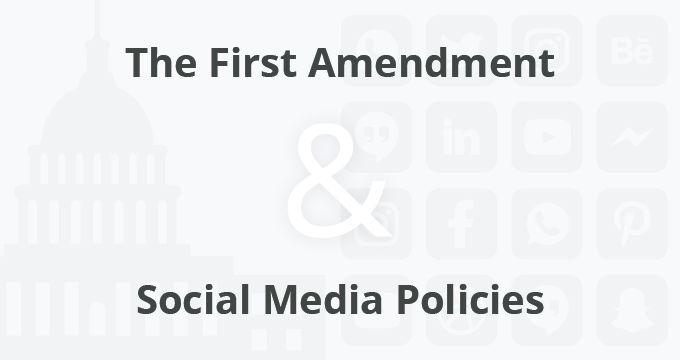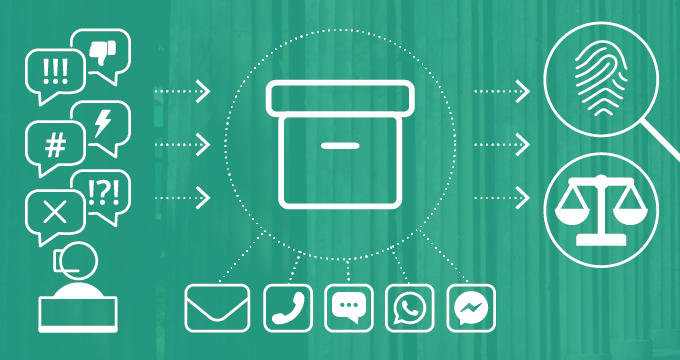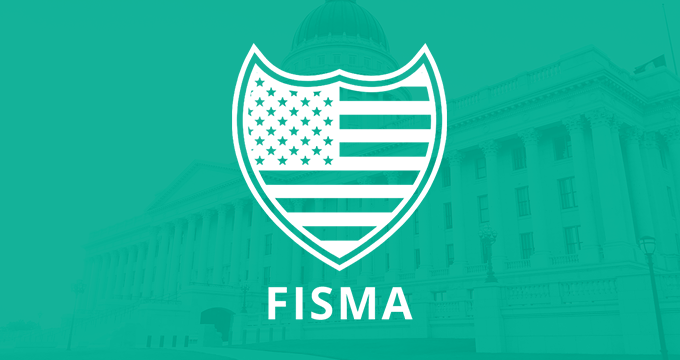The First Amendment to the United States Constitution is one of the pillars of American democracy.
Its core purpose is safeguarding essential freedoms like speech, press, religion, and assembly. While its role in protecting these rights against government interference is clear, its application in a digital context is less straightforward.
Social media platforms, now the dominant arenas for public discourse, present a challenge due to their private ownership, which complicates the First Amendment’s reach and has caused different controversies over the past few years.
Due to all this, government agencies have to be careful when moderating their social media accounts to ensure they do not infringe on individuals’ First Amendment rights, particularly when deciding to delete comments or block users, as such actions can be interpreted as government censorship.
In this article, we’ll explore the following:
- What is the First Amendment
- Does the First Amendment apply to social media
- What you shouldn’t delete from your social media
- How to moderate comments and stay compliant
What Is the First Amendment?
The First Amendment to the United States Constitution prevents the government from passing laws or taking actions that prevent individuals from expressing their views and restricting their freedom of speech. This protection is particularly critical when the government itself facilitates public discourse, such as in public meetings or on official social media platforms.
However, the extent of this protection is not uniform across all government-managed spaces. It’s helpful to consider two key categories:
Traditional public forums — These spaces, such as streets and parks, have historically been venues for public expression. Here, the First Amendment provides the strongest safeguards, and government interference is minimal. While the government can implement reasonable restrictions on the “time, place, and manner” of speech (think permits for large gatherings or noise ordinances), these restrictions must be content-neutral and applied equally to all.
Limited public forums — In contrast, spaces like a public meeting or a government-operated social media accounts, while still subject to First Amendment protections, allow for greater regulation of speech. This is because these platforms are often created for specific purposes.
Here, the government can impose restrictions that are reasonable and viewpoint-neutral, ensuring that discussions remain relevant to the forum’s purpose. For example, a government agency might moderate comments that are off-topic, promote illegal activity, or contain personal attacks.
Across all forums, a crucial principle is that the government can’t engage in viewpoint discrimination.
This means that while it can regulate the context of speech, it can’t favor one side of a debate over another. All viewpoints, even those the government finds disagreeable, must be allowed a platform for expression, provided they adhere to the forum’s reasonable restrictions.
The First Amendment and Social Media
Most courts that have examined the issue agree that social media accounts operated by government entities constitute limited public forums.
This classification means that while these platforms are not as open as traditional public forums like parks or streets, they still must adhere to First Amendment principles.
In such forums, individuals have the right to express their opinions, and it is generally unlawful for government officials to hide, delete, or block comments based on a person’s viewpoint, even if the content is controversial or unpopular.
It’s important to note that government moderation policies differ from platform-specific rules. Private companies like Meta or X enforce their own terms of service, which may restrict certain types of content, such as misinformation or hate speech, even if that content is protected under the First Amendment.
Public agencies operating on these platforms must monitor the content on their accounts and balance the platform’s terms with their obligation to uphold constitutional free speech rights.
What Should Public Agencies Do When Facing Problematic Comments?
As a public agency managing a social media account, you may encounter comments that clash with your organization’s values or seem inflammatory. Knowing how to respond while respecting First Amendment rights is crucial.
Moderating social media improperly, especially by deleting comments or blocking users based on their viewpoints, can lead to significant legal risks, including accusations of censorship and potential lawsuits.
The Hidden Risks of Overstepping the First Amendment
Many public agencies are unaware of just how broad First Amendment protections extend online. Speech that might seem offensive, critical, or even factually incorrect is often protected. For example:
- Harsh criticism of government policies is protected, even if it seems disrespectful.
- Comments expressing extreme political opinions are generally covered under free speech as long as they don’t incite violence or include threats.
- Misinformation or conspiracy theories, may still fall under protected speech unless they cause direct harm or violate platform-specific rules.
Balancing Free Speech and Moderation
While public agencies must be careful to respect free speech, this does not mean their hands are completely tied.
Agencies can enforce content-neutral rules to moderate comments, such as prohibiting spam, obscene language, or direct threats. However, these rules must be applied consistently and documented clearly in a social media policy to avoid accusations of bias.
Understanding these principles is essential for any public agency operating in the digital space.
By respecting First Amendment rights and establishing clear guidelines, agencies can create an inclusive and legally compliant environment for public discourse.
What You Shouldn’t Take Down from Your Social Media
How does freedom of speech on social media intersect with government moderation, and where should public agencies draw the line when managing comments?
The First Amendment often provides the strongest protection to speech that is controversial or problematic. Deleting comments on the grounds that they are “misleading” is a risky path to take. After all, nearly any statement can be perceived as misleading to someone, depending on their perspective or interpretation.
If an individual believes their First Amendment rights have been violated on a government-operated social media account, they can sue both the agency and the individual responsible. These cases represent serious constitutional violations, underscoring the importance of exercising caution when deleting or hiding comments.
Hate speech and offensive content
One of the most misunderstood aspects of social media moderation is hate speech. While offensive or hateful language may go against the values of your agency, it is still generally protected by the First Amendment when posted in a limited public forum, such as a government-run social media account.
For example, if someone’s hateful comment is deleted, hidden, or blocked in a way that infringes on their constitutional rights, they can file a lawsuit in federal court. The Supreme Court and other federal courts have consistently ruled that even offensive, hateful, or harassing comments are protected in a limited public forum.
While this type of content can be frustrating or even upsetting, government entities must tread carefully, as removing it without clear, legally defensible justification can result in legal consequences.
What Isn’t Protected Under the First Amendment
As a public agency, it’s important to understand what the First Amendment does not protect when moderating social media comments.
Below is a list of content types which can typically be deleted or hidden:
Defamation — Defamation involves making a false statement of fact that harms someone’s reputation. To qualify, it must be false and cause damage. Opinions cannot be considered defamatory, so they cannot be removed for that reason.
Threats — Actual threats are not protected by the First Amendment. In most cases, making a real threat is a crime, and you may need to report it to law enforcement.
Obscenity — Obscene content, such as pornography or material harmful to children, is not protected. However, swearing is generally not considered obscene and is usually protected.
Illegal activities — Comments that attempt to commit, promote, or encourage criminal acts can be removed. You should also report such activity to the police.
Illegal discrimination — Any statement that explicitly promotes or encourages illegal discrimination by your agency can be removed. The First Amendment does not grant a right to demand discriminatory actions from the government.
Copyright — Copyrighted material posted without the creator’s permission is not protected and can be deleted
Malware links — Malicious links intended to disrupt computer systems are not protected speech and may be removed.
Spam — Irrelevant or off-topic comments that do not contribute meaningfully to the discussion may be deleted.
How Jatheon Can Help
Government agencies inevitably encounter comments and activity on your social media that conflict with their core principles. While some individuals may align with your mission, others may not — and managing this discourse requires careful adherence to the First Amendment.
Deleting or hiding comments, even when permitted, can carry legal risks and may not always be the best course of action. A better approach is to archive social media interactions to maintain a transparent and compliant record.
For example, if your agency faces defamatory comments, having an archived record can provide crucial proof of the content and its context rather than simply deleting it. This is where Jatheon can help.
Jatheon’s social media archiving solutions allow you to:
- Preserve authenticity — Capture and store social media data in tamper-proof archives to ensure records are reliable for legal cases.
- Automate legal holds — Simplify the process of preserving specific content during litigation.
- Streamline compliance — Meet FOIA and regulatory requirements effortlessly with organized, searchable records that make ediscovery easier.
Take control of your social media presence while ensuring compliance and transparency. Book a demo or contact us today to learn more!
The Summary of the Main Points
- The First Amendment safeguards essential freedoms, including speech, press, religion, and assembly, and primarily protects individuals from government interference. Its role in the digital space, however, needs some clarification, especially regarding social media.
- Government-operated social media accounts are considered limited public forums, where public agencies must allow free expression while enforcing viewpoint-neutral, reasonable restrictions.
- Government agencies must navigate the tension between respecting free speech and moderating problematic comments. Deleting or blocking comments based on viewpoint can lead to legal risks, including lawsuits for censorship.
- Offensive or hateful comments, misinformation, and extreme political opinions are typically protected under the First Amendment in limited public forums, even if they conflict with an agency’s values.
- Comments involving defamation, true threats, obscenity, illegal activities, illegal discrimination, copyright violations, malware links, and spam are not protected under the First Amendment and may be moderated.
- Agencies must establish clear, content-neutral social media policies and consistently apply them to avoid accusations of bias or overreach.
FAQ
Does the First Amendment apply to all social media platforms?
No, the First Amendment primarily applies to government entities and prevents them from restricting individuals’ freedom of speech. Private social media platforms, like Facebook or X, can enforce their own content policies and are not bound by the First Amendment. However, government-operated social media accounts must comply with First Amendment protections.
Can government agencies delete comments on their social media pages?
Government agencies can delete certain types of comments, such as those involving threats, obscenity, illegal activity, or spam. However, they cannot delete comments solely because they disagree with the viewpoint expressed, as this would violate First Amendment protections.
Is hate speech protected under the First Amendment?
Yes, in most cases, hate speech is protected under the First Amendment, even when it is offensive or upsetting. Government agencies must be cautious when moderating such speech on their social media accounts to avoid allegations of censorship.
Does social media censorship violate the First Amendment?
No, unless a government agency is involved. The First Amendment protects against government censorship, not actions by private companies like social media platforms. Social media companies can set their own content rules without violating the Constitution. However, if the government pressures or mandates censorship on these platforms, it could raise First Amendment concerns.
Read Next:How to Manage Public Record Compliance with FOIA Software |











